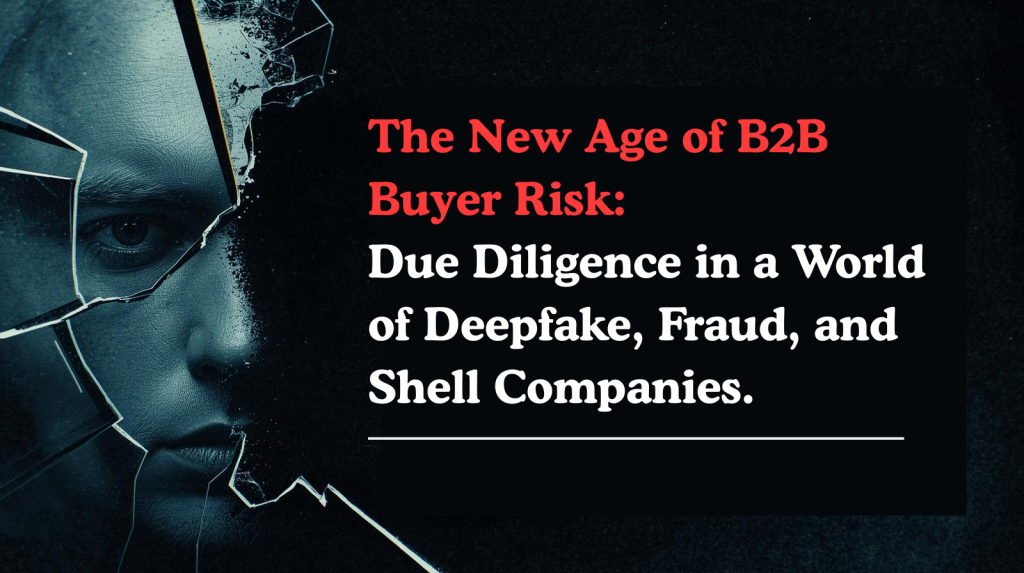The nature of B2B risk has changed dramatically in the past few years. Due diligence, once limited to checking tax IDs, financial statements, and credit history, is now being tested by the rise of deepfakes, shell companies, and sophisticated digital fraud. Bad actors are leveraging AI, automation, and fake identities to infiltrate legitimate supply chains and procurement processes. This isn’t a theoretical risk—companies across the globe are already being deceived by synthetic identities and false credentials masked behind seemingly professional entities. Traditional verification is no longer enough.
The Deepfake Era: Fraud You Can’t Detect by Eye –
Deepfakes aren’t just for manipulating celebrity videos—they’re now being used to impersonate executives in video calls, simulate live meetings, and pass off fraudulent requests as real. With AI-powered voice synthesis and video editing tools, scammers are tricking even experienced procurement and finance professionals. In some cases, high-level financial transactions have been approved after fake video calls from “known” business contacts. Deepfake fraud is no longer science fiction—it’s enterprise-grade deception.
- Deepfakes used to mimic real business leaders
- AI voice cloning creates convincing phone scams
Shell Companies: The Professional Mask of Illicit Intent –
Shell companies have long been used for tax evasion and money laundering, but today, they’re tools for large-scale B2B fraud. Registered in jurisdictions with low disclosure requirements, these entities appear legitimate, but hide the real owners and intentions. Procurement teams often engage with these companies unaware of the risks, only realizing after contracts are signed or payments made. Without real-time registry verification or ownership transparency, these companies can operate undetected for years.
- Shell companies registered with fake identities
- Often located in “secrecy havens” with minimal oversight
- Used to bypass sanctions, taxes, or legal accountability
- Appear normal on paper, making detection harder
- Can expose buyers to legal and reputational risk
Cybersecurity is a Due Diligence Priority –
The security posture of your vendors or buyers now directly affects your business. A compromised vendor system can serve as an entry point into your infrastructure, leading to breaches, data leaks, or compliance violations. B2B due diligence now must include cybersecurity assessments, not just financial and legal checks. Companies failing to monitor third-party risk are increasingly targeted by attackers who look for the weakest link—often a small, poorly protected supplier.
- Third-party risk is now a major compliance focus
- Poor vendor security can lead to ransomware attacks
- Cyber audits and certifications are essential checks
- Real-time threat monitoring needed for key partners
Modernizing B2B Due Diligence: What Leading Firms Are Doing –
To stay ahead of fraud, forward-looking companies are upgrading their due diligence playbook. This includes investing in AI-powered tools, third-party risk platforms, and beneficial ownership screening. They also use tiered verification levels—more rigorous checks for high-risk geographies or large deals. Collaboration across procurement, compliance, finance, and IT is becoming standard. Static onboarding processes are being replaced with continuous monitoring systems that trigger alerts when anything suspicious occurs.
- AI and machine learning tools to detect anomalies
- Tiered risk-based onboarding and verification
- Beneficial ownership checks across jurisdictions
- Integration of legal, finance, and IT in vendor reviews
Global Regulations Are Raising the Stakes –
Governments and regulatory bodies are tightening the rules around supplier verification, ownership disclosure, and anti-money laundering (AML). From the EU’s Corporate Sustainability Due Diligence Directive (CSDDD) to the U.S. Corporate Transparency Act, compliance is no longer optional. B2B firms are expected to not only know who they’re dealing with but also document how they know. Non-compliance can result in fines, sanctions, and even criminal charges for executives. The legal burden is shifting: ignorance is no longer a defense.
- New global laws require beneficial ownership transparency
- Supply chain laws extend liability to third-party actions
- Firms must prove due diligence, not just claim it
- AML and KYC rules now apply in more B2B sectors
Reputation Risk is an Invisible but Expensive Cost –
Even when fraud doesn’t result in direct financial loss, the reputational damage can be devastating. Doing business with fraudulent or unethical partners—even unintentionally—can lead to public backlash, lost clients, and broken investor trust. In the age of social media and instant reporting, news spreads fast. B2B relationships rely heavily on credibility. A single headline tying your firm to a fake vendor, sanctioned entity, or fraudulent deal can wipe out years of brand equity.
- Buyers expect ethical sourcing and responsible partnerships
- Scandals damage long-term client confidence
- Public contracts and RFPs may be lost due to bad PR
- Investors demand higher transparency from vendors
Conclusion –
In the new age of B2B buyer risk, trust must be earned, verified, and continuously monitored. Deepfakes, shell companies, and digital fraud are not passing trends—they’re a permanent part of the threat landscape. Companies that fail to evolve their due diligence practices are not just vulnerable—they’re likely already exposed. Risk now lives in video calls, email threads, and cloud tools, not just balance sheets. The smartest organizations are investing in verification frameworks that treat trust as a measurable, managed asset—not a default assumption.

